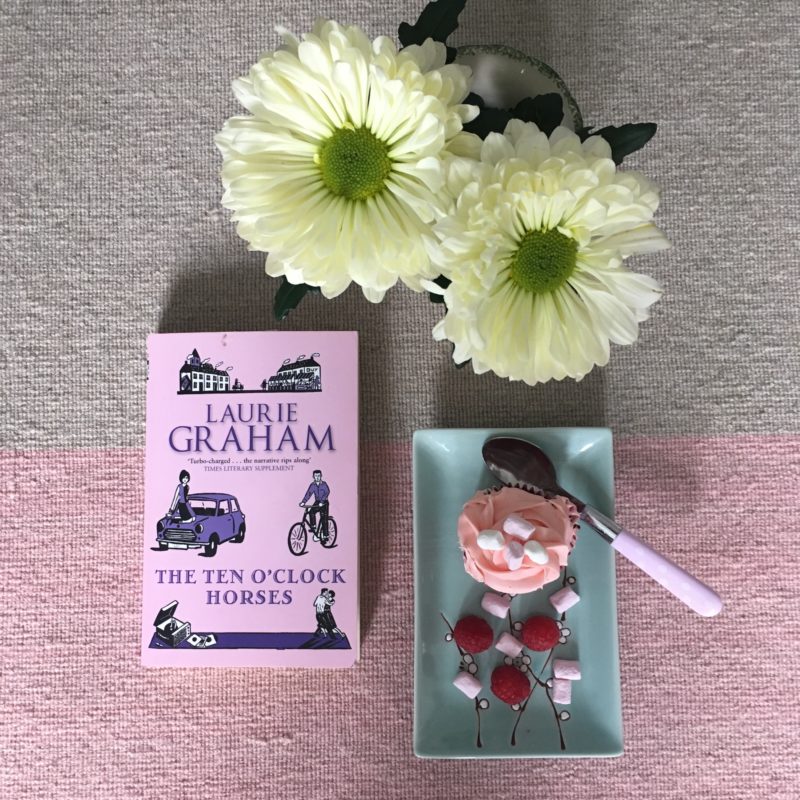
Don’t be deceived by the cover of this book. As I’m sure I’ve unoriginally said before, you can’t always judge a book by its cover, and I feel this is a fine example. I can’t pretend that I wasn’t drawn to this book initially by its sugary pink cover and didn’t see beyond that. I like pink! I had in mind it would be a gentle read, something to soothe and coddle a work weary soul. I some how failed to read the quote on the back by the TLS which describes The Ten O’Clock horses as “Turbo charged by the palpable rage and desperation of its hero…..” Had I been a little more astute I would have realised that palpable rage rarely leads to a comforting read, and would have been a little less surprised. I would also have realised that Laurie Graham is an author I have read before. She wrote ‘The Future Home makers of America’ a novel which I love.
It is 1962. The first avocado pears are appearing at the greengrocers, people are thinking about carpeting their lavatories and boxing in their banisters, and Ronnie Glover, housepainter, husband and father, is feeling the first vague stirrings of discontent with his life. Then, out of the blue, the fabulous, sophisticated (and married) Jacqueline bursts into his life and teaches him to tango. She seems to offer everything he ever dreamt of. But is it all too good to be true? What can a woman who has traveled the world want with a man who carries a stub of pencil behind his ear? And are the Ten O’Clock horses of Ronnie’s painful childhood awake and sniffing the wind?
From page one it is clear that house painter Ronnie Glover is discontented with life. He is on holiday with his family in a boarding house where he is too embarrassed to use the lavatory to ‘do what a man’s got to do’ and where food portions are so small his ‘guts are rumbling all the time.
“Some holiday, Susan chewing gum. Bloody I-Spy books all over the place, Gillian scowling and answering back and going to the lav with a Dr White’s up the sleeve of her cardigan. And not even any whassiname on a Friday”
Set in the 1960’s, this a commentary on a world at change. The war years are over, there is a promise of something more exciting in the air and the working classes are starting to reach for a better life. Ronnie is a man with aspirations, he is teaching himself Italian and creating art in his shed. He wants to paint exotic fruits and drink wine. Eileen, his wife is less aspirational. Eileen has chilblains, she always cleans the oven on a Sunday afternoon and spreads a towel across the mattress before any Friday night whassiname. Ronnnie’s aspirations involve reaching out to Jacqueline a woman so sophisticated he is overwhelmed by her easy acceptance of him. She offers Ronnie an escape from a life which has become ever more tedious.
Each character has a rightful place in the novel, each adds to the readers understanding of Ronnie whilst bringing issues of their own which Graham handles admirably. From Ronnie’s mother who makes it clear having him was an inconvenience to the neighbour who adds a certain something to his fathers life. Each is given space to develop and state their rightful claim in Ronnie’s story
I enjoyed reading a novel where the protagonist was male, not something I do terribly often. I can’t pretend to be fully in tune with the inner workings of a 1960’s 30 something male but I suspect that Laurie Grahams characterisation and assumptions made through Ronnie are pretty accurate.
For me The Ten O’Clock Horses has been a good reminder of how much I enjoy Laurie Graham’s writing. I was moved and made to laugh in equal measure, and ultimately prompted to read more from her, even if it hasn’t got a pink cover.
